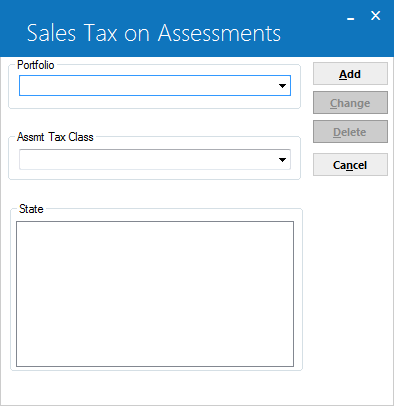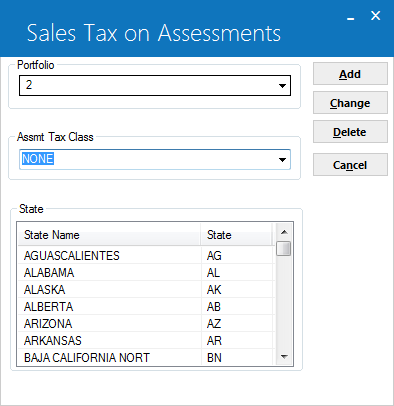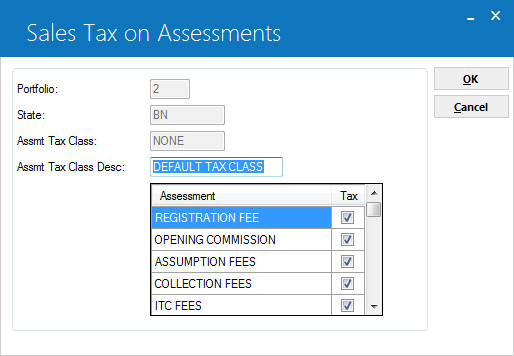Sales Tax On Assessments [U0725]
Contents
Introduction
The Sales Tax on Assessments Update [U0725] governs charging sales tax on assessments/recurring charges. This update is only available if the Sales Tax on Assessments Module is purchased. The user can specify whether sales tax is to be charged on any given assessment or recurring charge, by state, portfolio, and assessment tax class.
The user maintains a table through [U0725] that designates whether a given state requires that sales tax be charged on specific assessments/recurring charges. For added flexibility, LeasePak stores this information at the state level within portfolio. Starting from LeasePak v6.5a onwards users can define the assessment/recurring charge#&39;s taxability in a given state based on an assessment tax class that is indicated on the asset receiving the assessment/recurring charge.
If user chooses not to use the assessment tax class to further break down when tax should be charged, the default assessment tax class of 'NONE' will be used. Any records existing in the table for U0725 at the time of moving to v6.5a will have the assessment tax class populated automatically with 'NONE'. All assets that have no assessment tax class will be matched to the assessment tax class of 'NONE'.
When the user wants to use a new assessment tax class, they will enter a new value for assessment tax class in assessment tax class field of U0725, select a state, and click Add. On the next screen, a description must be entered for the assessment tax class and the taxability set before clicking OK. When the settings are saved, the new assessment tax class is also created and available to be added to any assets. Changes to the description of the assessment tax class can be made through U0722.
When determining taxability, if the new assessment tax class is assigned to an asset in a state or portfolio, which that assessment tax class has not been, set up through U0725, LeasePak will look for a match for that portfolio, state, assessment code, and the assessment tax class of “NONE”. This way, only states where the assessment tax class is taxed differently than no assessment tax class need to be setup in U0725, but the assessment tax class can be assigned to any asset.
Once this table is set up, all updates within LeasePak which result in placing an assessment or recurring charge on an invoice read the table and determine whether to charge sales tax on the assessment or recurring charge. The tax to be charged is designated by the tax code on the asset record. However, if the tax code is NOUT or NOPF, the system functions as if the code is ALL. For more explanation of asset-level tax codes, refer to Add Asset [U0101] or the Application Asset tabs [U0801].
If sales tax is to be charged, the tax amount will be calculated and accumulated into the sales tax bucket for the invoice and a flag will be set to indicate that sales tax was charged on the assessment/recurring charge.
If the user is changing an assessed amount on an existing invoice, the system will only charge sales tax on the new amount if tax was charged on the original assessed amount on that invoice.
Sales tax will never be charged on property tax or FHUT for off-lease assets.
If an assessment that is normally taxable in a given portfolio/state is determined to be non-taxable due to the exempt status of the asset, then nontaxable gross receipts will be reported. If an assessment is not normally taxable in a given portfolio/state, then nontaxable gross receipts will not be reported.
The following updates in LeasePak are affected by this module:
- Book Lease [U0101]
- Assessment and Assessment Waiver [U0105]
- Group Property Tax Assessment [U0106]
- Payment Extension and Payment Extension Reversal [U0107]
- Lease Extension and Lease Extension Reversal [U0108]
- Rebook [U0116]
- Payment Due Day Change [U0118]
- Cycle Accruals and Reverse Accruals [U0301]
- End
of Period [EOP]
Note: Sales tax on assessments must not be set up in a portfolio that has a recurring charge type T(tax). Refer to Assessment Customization option of the Portfolio update [U0212] for information on recurring charge type T.

This screen is used to input the portfolio, assesstemnt tax class, and state to be added, modified or deleted.
Field Descriptions
- PORTFOLIO
Enter the portfolio code to add or modify. Use Help to see a list of existing portfolio codes. A message will appear, and additions or changes will not be allowed, if the portfolio has any type T recurring charges, as established in the RECURRING CHARGES screen of the Assessment Customization option of Portfolio [U0212].
- ASSESSMENT TAX CLASS
Enter an assessment tax class code. This field is required when setting up sales tax on assessment table that governs whether or not sales tax is to be assessed to various assessments. Users must add a valid assessment tax class code. This is a drop down menu field and allows a user to select one of the assessment tax class code already added. LeasePak provides NONE by default. If assessment tax class is selected than Sate filed is mandatory. An Assessment tax class is not required if an assessment tax class is not selected and saved information will not tied to an assessment tax class. - STATE
Enter the state code to add or modify. Use Help to see a list of existing state codes. The state must currently exist in the RLO (Location) file. Upon entry of a valid code, all assessments and recurring charges that are being used in that portfolio are displayed in the scrolled area. In add mode, all switches are set to Yes. The user may then change any assessment or recurring charge to No if sales tax is not to be charged on that assessment or recurring charge.

Add/Change Sales Tax On Assessments

This screen is used to enter or change the switches for whether to charge sales tax on the individual assessments and recurring charges.
Field Descriptions
- PORTFOLIO
The portfolio number selected from the previous screen will be displayed.
- STATE
Add or change the state code selected from the previous screen. - ASSMT TAX CLASS
The assessment tax class code will be displayed selected or entered from the previous screen drop down menu. - ASSMT TAX CLASS DESC
Enter the assessment tax class code description. If the assessment tax class description has been defaulted from, the existing assessments tax class code, than users can update the assessment tax class description. If changing the existing assessment tax class code description LeasePak prompts the following warning message to indicate users that the change will affect other assessment tax class with the same code. Changes to the description of the assessment tax class can be made through U0722 custom code. - ASSESSMENTS
(scrolled area)
The assessment names are displayed. If the Name Assessments module is purchased, customized assessment names will be displayed.
- SALES
TAX (Y/N) (scrolled area)
Check box if sales tax is to be charged on this assessment in this portfolio/state. Clear box if sales tax is not to be charged.Note: When adding more than one assessment, assessment boxes must be checked.
Delete Sales Tax On Assessments
From the Sales Tax on Assessments menu, the Delete button removes the selected record.
Select YES to delete the sales tax on assessment information for this portfolio/state. Select NO for the record not to be deleted. When deleting a code LeasePak also deletes the assessment tax class code from the rcc Custom Codes table.
LeasePak Documentation Suite
©
by NetSol Technologies Inc. All rights reserved.
The information contained in this document is the property of NetSol Technologies Inc. Use of the information contained herein is restricted. Conditions of use are subject to change without notice. NetSol Technologies Inc. assumes no liability for any inaccuracy that may appear in this document; the contents of this document do not constitute a promise or warranty. The software described in this document is furnished under license and may be used or copied only in accordance with the terms of said license. Unauthorized use, alteration, or reproduction of this document without the written consent of NetSol Technologies Inc. is prohibited.